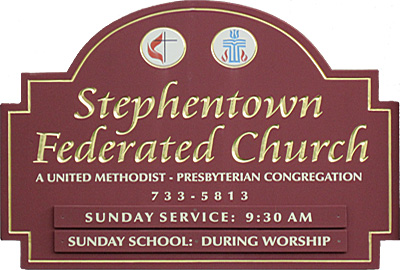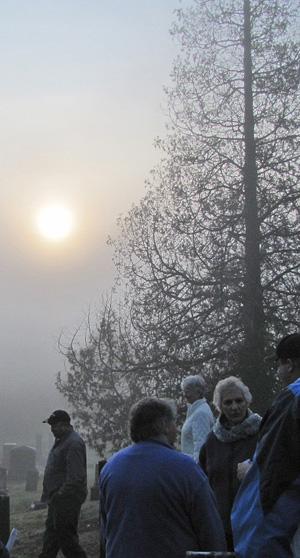Pastor's Sermons
Sermon for May 22, 2011 - "Many Mansions or One Way?"
Based on John 14: 1-7
This passage has been the basis for both much difficulty and much hope in interfaith dialogue; it also a passage where Jesus seems to condradict himself. First he says that God's dwelling has many mansions, and then he says that he is "the way." Which is it?
Let us remember that the community for whom John is writing is experiencing rejection by their own people. They have been cast out of the synagogue for following this new prophet, and thus have lost many friends and family members. John's focus in his writings is always to affirm that Jesus is the Messiah, the One who is sent by God. It is also significant that John puts this speech by Jesus at the Last Supper, when Jesus would be preparing his disciples for his absence. In that context, it makes sense that John has Jesus strongly stating his relationship/oneness with the Creator, exhorting his followers to remember that he is "the way." ( Also, in the earliest days, these disciples were not called "Christians." That word had not been invented yet. They were called "Followers of the Way.")
That still leaves us with two statements which seem to be in direct opposition to each other. What does that mean for our continued quest for better understanding of and peaceful coexistence with people of other faiths?
In researching this, I read a wonderful article by Dr. Harvey Cox, professor at harvard Divinity School and a world leader in interfaith dialogue. His article, from which I stole the title of this sermon, was titled, "Many Mansions or One Way?" (The Christian Century, August, 1998.) In it, he explains how each Religion has both particular and universal visions; he also outlines some very practical and accessible ways to interpret and live out the message of John's Gospel.
The particular vision of Christianity is Jesus dying for all. Its universal vision is the risen Christ, manifesting a God of the outcast, the poor and oppressed. God of all people, who calls us to community. In Judism, the particular vision is Torah being given to a Chosen People; the universal vision is a people still searching for the Chosen One.
Muslims have the Particular vision of Allah coming to Mohammed; the universal vision of the Koran is God creating all equal, and calling all creation to, as Cox says, mirror this unity.
We need both the particular and the universal vision.
Without the universal vision, we have ho dialogue. We have fanatisism, zealotry and violence. We have those who want dialogue demonized by fellow believers.
Without the particular vision, we lose a real, personal reason to believe; in fact, we lose the point of our belief. We lose our religion.
According to Dr. Cox, this passage can be interpreted two ways: either as Jesus saying that, because there are "many mansions," Christians, Jews, Muslims, Buddhists, Hindus and all other religions can live side by side in the realm of God, or Jesus saying that he is the only way, and others will be damned. Dr. Cox's interpretation is that Jesus said BOTH.
Maybe it was Jesus' way of letting us know that we must have both a particular view - the center of our faith - and a universal one - a vision of the Reign of God.
So... if we want to be followers of the Gospel, how do we know the way to peace with those of different belief? Well, if we use the life of Jesus of Nazereth as a guide, we will have some answers. First of all, we should live in the world as HE lived in it. Notice that his life project was to bring the Reign of God, to bring God's SHALOM to earth. This is not an abstract ideal; it is done by relating to and respecting real people without making stereotyoes or generalizations in our heads.
Jesus was not interested in doctrine, but in the practical outcome: compassion, forgiveness, healing, feeding.......... or not. "By their fruit ye shall know them."
Jesus' example also prepares us to meet God already present in others. His love encompassed all - sinners, tax collectors, porostitutes. The only thing he did not tolerate was the arrogance of the Pharisees - those who thought they had the answers. Imagine if all people were open to respectful dialogue and saw the divine in others... the world just might break out in peace!
So, my friends, Dr. Cox helped me to see that his Gospel passage is not as contradictory as I once thought. There are many mansions. There is one particular Way to which many are called We are not expected to give up our own "cornerstone' of the Gospel in order to effect peaceful dialogue. If we did, we would lose our raison d'etre. We are expected to keep our own foundational beliefs and also hold a universal vision which includes all.
If we all did this, then the world would not be spiraling down to destruction, as some would have us believe. We would each bring our cornerstones, and BUILD the realm of God, in which there would be room for all. And what a City of God we could build! Blessings.......................


